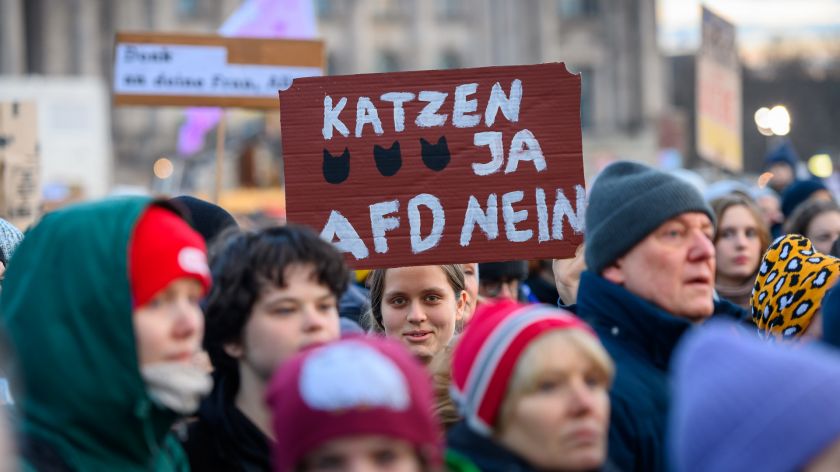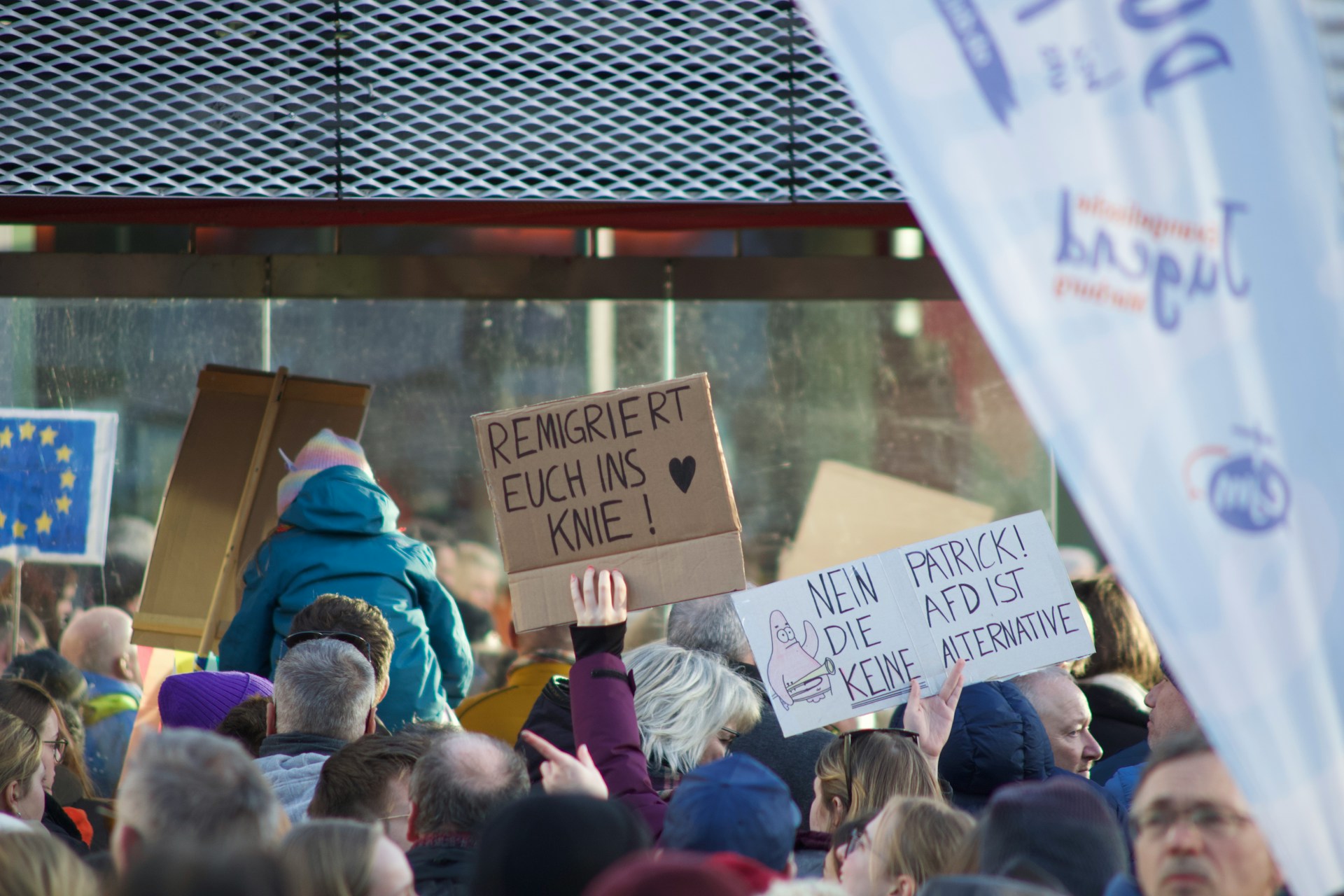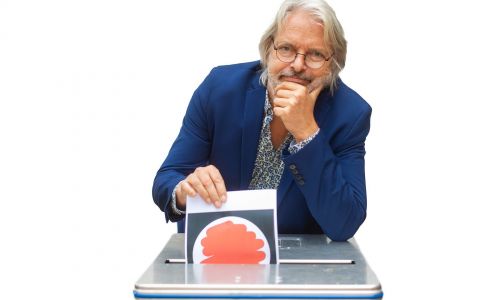Mass protests in Germany against secret deportation meeting: ‘There are ways to erode a democracy’
-
 Street protest in Berlin, 21 January. Photo: Stefan Müller (via Flickr)
Street protest in Berlin, 21 January. Photo: Stefan Müller (via Flickr)
After hundreds of protests throughout Germany over the last days, the worry about rising poll numbers of right-wing parties like the German AfD are also felt at Radboud University. Among the protestors is the German astrophysicist Heino Falcke: ‘We have to ask ourselves: where is this heading?’
More than one million protestors took to the streets in Germany over the past few days. The protests followed a secret meeting of right-winged extremists in Potsdam. There, members of the German party AfD and others discussed mass deportations of immigrants, refugees, and ‘non-assimilated’ German citizens. The AfD is presently leading the polls in East Germany ahead of some key regional elections.
‘I think many people are not aware how many people are affected by this’
Less than twenty kilometres from the German border, at Radboud University, the talk of mass deportations and resulting mass protests are also hot topics of discussion. One of the German students who went to protest in Germany is Nadine Krivanek. ‘I read some reports that there were 10.000 people at the protest in Kleve I attended,’ says the first-year Psychology student from the south of Germany. ‘It was a good atmosphere, quite relaxed.’ But Krivanek is still worried, also because of their own migration background. Krivanek’s mother migrated to Germany from the former Yugoslavia.
‘I think many people are not aware how many others are affected by this – people that are close to them,’ they say. ‘I still remember a conversation I had with an old school friend of mine, who had a very strong opinion of foreigners. Until I told her that my family and I are personally affected – I think that made her reconsider.’
Hope
Heino Falcke, professor of astrophysics at Radboud University, went to protest against right-wing extremism in Cologne a few days ago. ‘I was speechless when I first read about this secret meeting,’ Falcke says. ‘And I felt hopeless. This immediately reminded me of the Wannsee Conference (the 1942 conference where Nazi officials discussed details of the Holocaust, ed.). Of course, at the moment, this is only talk, something simmering below the surface. But it’s also a foundation for something of which we have to ask ourselves: where is this heading?’
‘Watching Geert Wilders and the FVD feels like sitting at a table where someone is purposefully burping and farting the entire time’
But that so many Germans decided to protest against right-wing extremism over the past days, gives Falcke hope. ‘It was great to see the general population turn up. This was a very relaxed demonstration with a lot of families, a lot of children, not only your standard activists. And that’s a strong message.’
At least for now, right-wing extremism doesn’t have support in the wider German population, Falcke thinks. The Netherlands is a different conversation: ‘For me, watching Geert Wilders and the FVD feels like sitting at a table where someone is purposefully burping and farting the entire time – and no one seems to take any issue with that.’ For Falcke, it’s important to draw a hard line when it comes to right-wing extremism, but he also thinks it important to continue having a conversation with one another – respectfully, even when there is disagreement.
Need for internationals
At the same time, especially the anti-international stance that is spreading through the Netherlands right now is damaging, according to the professor. ‘When it comes to astronomy or other technology in the Netherlands, we’re performing well above what the country could provide on its own,’ he explains. ‘How? Because the Netherlands knows how to communicate and attract internationally. We need internationals. And right now, we’re managing to have a lot of impact internationally while spending relatively little money.’
For political scientist Maurits Meijers, who lives just across the border in Germany, the migration discourse and the reactions towards it in the Netherlands and in Germany right now are central to understanding the countries’ recent political developments. ‘The way we talk about migration in many European countries at the moment is in the form of a problem instead of a chance.’ According to the assistant professor, the crucial actors here are not necessarily the right-winged extremists, but also moderate parties.
‘Of course, if the VVD in the Netherlands or even Olaf Scholz (German chancellor and member of the Social Democrats, ed.) in Germany frame migration like this, then that plays into the hands of Wilders and the AfD,’ Meijers explains. ‘Migration is made into this huge topic and if the voters then also start perceiving it as such, they will vote for the parties that have a harsh stance towards migration. Especially if they know that other parties have signaled that they would work together with them. Why would anyone vote for the more moderate second choice then?’
‘That this prompts mass protests in Germany while millions of Dutch citizens have just voted for Wilders. That’s a stark difference’
Like Falcke, Meijers was initially shocked when it came to the secret meeting to discuss mass deportations, also of German citizens with migration backgrounds. ‘But it’s nothing new. Geert Wilders has said this too. He said it ten years ago. It’s just interesting that the idea of this prompts mass protests in Germany while millions of Dutch citizens have just voted for Wilders – or at least for his party. That’s a stark difference.’
Liberal democracy
Of course, just because there have been talks about mass deportations does not mean they will translate into reality. ‘Germany and the Netherlands are liberal democracies with liberal constitutions that guarantee certain rights. And that protects us from parties who want to overhaul this.’ At the same time, the increasing strength of those parties is nothing to be underestimated, Meijers says. ‘It’s not easy changing the constitution – but it’s not impossible either. Even though we have acted for a long time like it would be.’
‘It’s not easy changing the constitution – but it’s not impossible either’
For Meijers, the established parties again play a key role here. ‘They need to be conscious of their democratic responsibilities – and they need to draw a clear line when it comes to right-wing extremism.’ And, most importantly, says Meijers, they need to find ways to gain people’s support again: ‘You don’t gain that support by copying right-winged populists. You gain support by having your own story. And that’s something that has gone missing over the past years. Parties can impact people’s perception of what matters through the way they talk about specific issues. And what are the big issues of society right now? Is it migration? Or is it a basic level of social security?’
Erosion
‘I think it’s important to maintain a level of objectivity as a researcher,’ Meijers says. ‘But when it comes to democracy, we need to draw a line. For example, adopting a restrictive migration policy it is not undemocratic in itself. But if anti-migration policies are realised, they often go hand in hand with consequences for minority rights. And that’s when we enter a dangerous undemocratic domain. The problem is not restrictive migration policy itself, but the way it’s being done and what comes with it – and there lies the danger.’
And when it comes to the AfD’s position in the upcoming elections in Germany? ‘The fact that there were protests is an important signal,’ Meijers says. ‘But if a party like the AfD or the PVV gets into power, there are ways to erode a democracy through legitimate democratic channels.’




